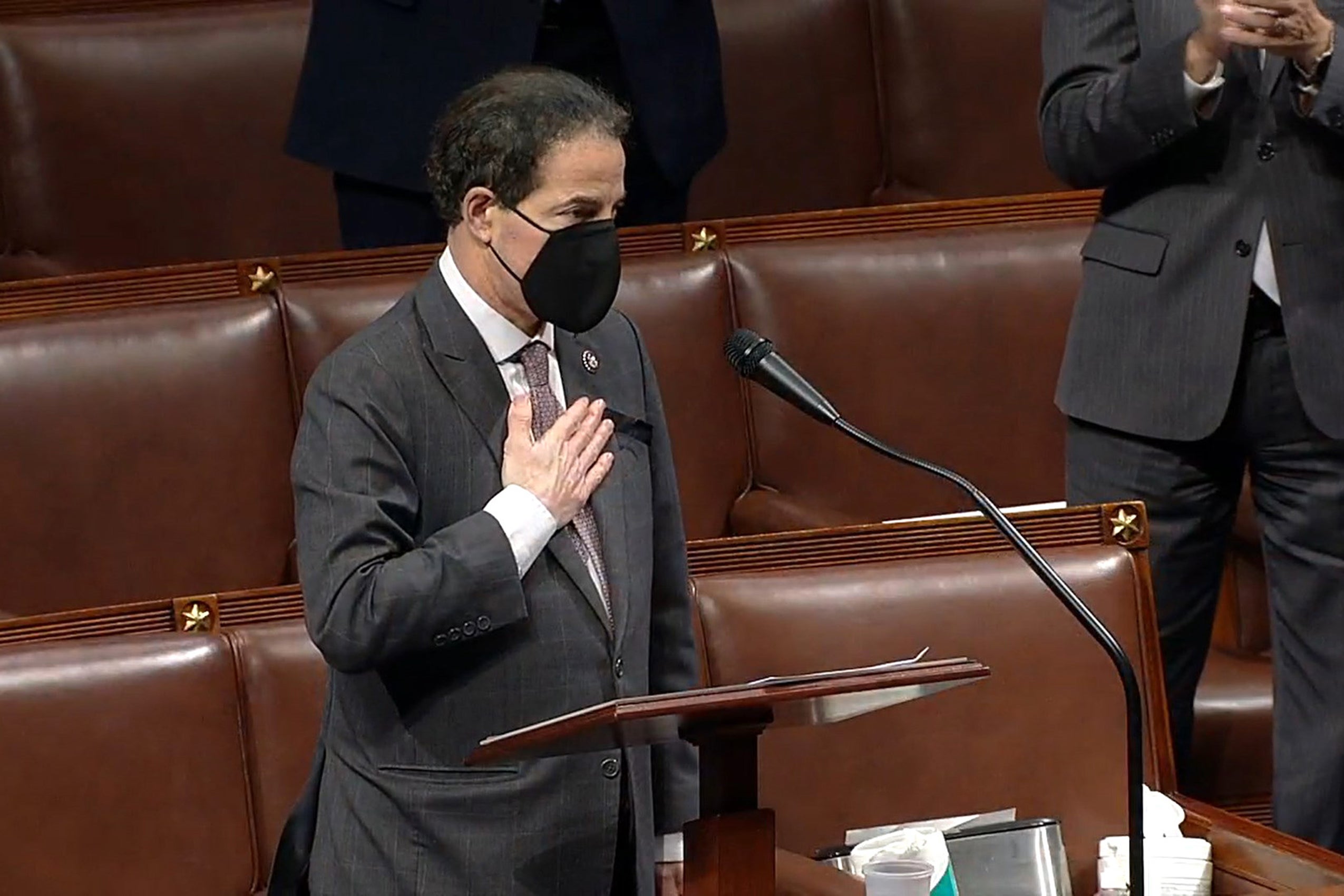Rep. Jamie Raskin (D-Maryland) became nationally known earlier this year as the lead House impeachment manager seeking President Donald Trump’s conviction in the Senate for his role in the Capitol insurrection of January 6. “Senators, this cannot be our future,” he said during the trial. “This cannot be the future of America. We cannot have presidents inciting and mobilizing mob violence against our government and our institutions because they refuse to accept the will of the people under the Constitution of the United States.” While he pled the case, he was in mourning for his son, Tommy, a Harvard Law student who died on December 31. Raskin, who prior to being elected to Congress was a constitutional law professor at American University’s Washington College of Law, spoke to Harvard Law Today on Friday, March 12, from his home in Maryland about Tommy, the day the Capitol was breached, the progressive politics that, he said, “run in my blood,” and how a fellow HLS student’s dream changed the course of his life.
Harvard Law Today: President Biden just signed the COVID-19 relief bill passed by Congress. What do you think are the main benefits of the bill?
Jamie Raskin: The COVID-19 bill, to me, is the finest possible answer to the insurrectionary violence and mob attack we experienced on January 6. The $1.9 trillion package is proof positive that democracy can work as an instrument of the common good. And that ultimately is the best answer to a collapse into fascism and banana republicanism.
HLT: I see the insurrection is still on your mind.
Raskin: Very much. I should also say that the COVID-19 legislation and all the progress we’ve made are a reflection of the triumph of science. I mean, it is science that has gotten us through this. And that in itself is a great refutation of all of the magical thinking, irrationalism, quack medical cures, and paranoia that we are emerging from.
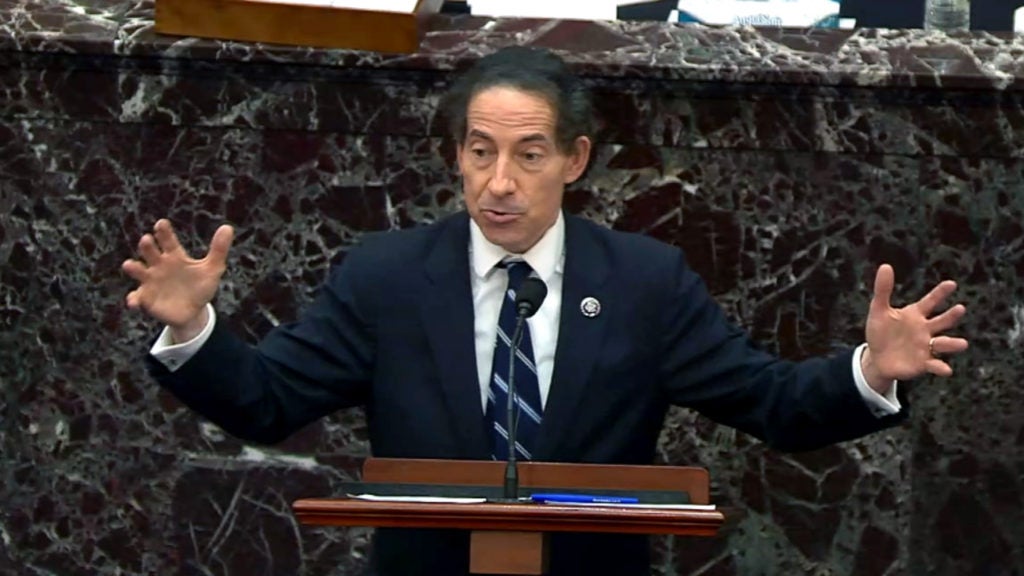
HLT: From the outside, it appears that there is a lot of tension within Congress. Can you give a sense of how Congress is functioning day-to-day in this atmosphere?
Raskin: Well, it’s been very tough since January 6, to tell you the truth. You know, it’s as if there were a violent mob attack on your home. And then one parent and most of the kids want to address it, and the others want to excuse it and just move on and even sanitize the event by claiming that it was nonviolent and peaceful and in the tradition of American civil disobedience. So we do have a problem there. There is no doubt. This was the most serious presidential crime in American history. And we do have members of Congress who continue to partake in the big lie. That is not just like a disagreement about how much money we should spend on COVID relief or whether you favor a universal criminal background check or not. On the other hand, there have been some wonderful bipartisan relationships formed. Seventeen Republicans broke from the orthodoxy within their party and voted to impeach or convict Donald Trump, and those people have been very integrally involved with Democrats on a whole bunch of matters.
HLT: You were at the Capitol with your daughter on January 6. What was it like for you and her personally that day?
Raskin: This has been a period of profound trauma in the life of my family. We lost our son Tommy, who was a second-year student at Harvard Law School, on the last day of 2020. And we had his burial service on January the 5th. The next day, as I was preparing to go to work, our youngest daughter, Tabitha, made a plea for me not to go since we hadn’t been away from each other. I told her I had to constitutionally because we were counting the presidential electors, but I invited her and everyone else to come with me. Tabitha decided to come and so did my son-in-law, Hank, who is married to our older daughter, Hannah. They watched the proceedings when I was defending the integrity of the election against the objections that were being raised. Then they left to go back to [Maryland Rep.] Steny Hoyer’s office, which he had allowed us to use.
“They turned Capitol Hill into the capital of hell for us.”
It was just moments later that we heard there had been a breach in security at the Capitol. And then all hell broke loose. We heard this sound, which I won’t forget, of people charging with what sounded like a battering ram against the door. The new chaplain of the house got up to offer an impromptu prayer. We were told to take out gas masks, which most of us were not even aware existed on the House floor, much less how to use them. A lot of people were calling their spouses or children to say goodbye. And people were removing their congressional pins so they wouldn’t be recognized by the mob. There was chanting: “Hang Mike Pence, hang Mike Pence.” There was, I suppose, a subcommittee of the mob that was out searching for Nancy Pelosi. The president told them to fight like hell, and they brought us hell that day. They turned Capitol Hill into the capital of hell for us. It was more than an hour later, after we were evacuated, that I was able to make direct contact with Tabitha and with Hank and with my chief of staff. The Capitol officers got them out. But they had been hiding under a desk; they had barricaded the door. My chief of staff, whom I told to guard the kids with her life, did that. She found a fire poker in the fireplace where they were and then she wielded that at the door. So that was another trauma for everybody.
HLT: Why did you decide to take on the responsibility of being the lead House impeachment manager so soon after losing your son?
Raskin: I think all of the impeachment managers were driven by a mixture of passion and anger about what had taken place. Certainly I was. But I also felt a sense of duty and honor to the country, to my constitutional oath, but perhaps above all to Tommy and to the rest of my family. I’ll probably spend the rest of my life trying to figure out how all of these different events relate to each other. But I know that Tommy Raskin was someone who acted fiercely and courageously to stand up for what’s right in every context. And I was not prepared to lose my son at the end of 2020 and my country at the beginning of 2021.
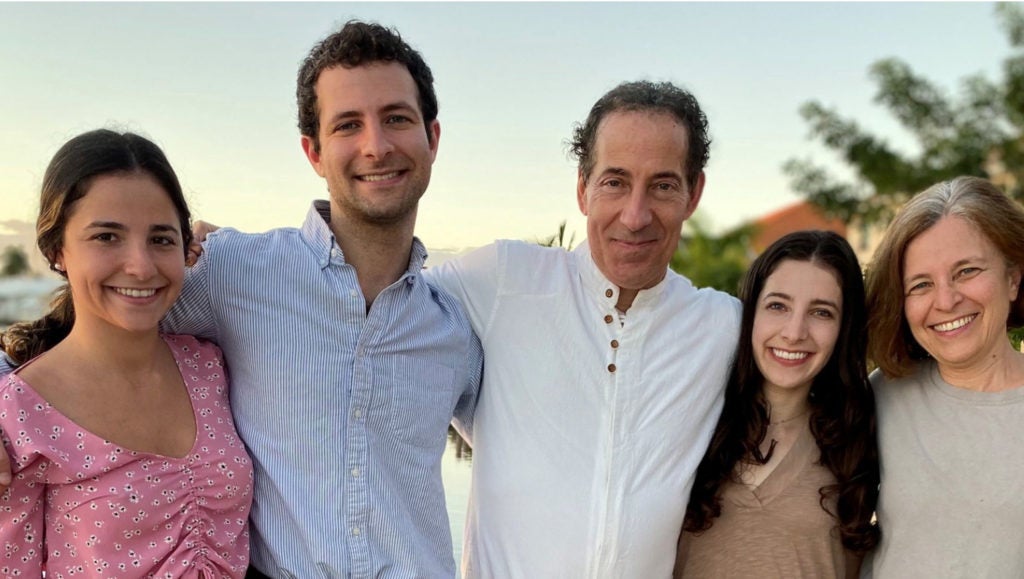
Jamie Raskin (center) and Sarah Bloom Raskin (right), with their children Tommy, Hannah and Tabitha.
HLT: What would you like people to know about Tommy?
“I was not prepared to lose my son at the end of 2020 and my country at the beginning of 2021.”
Raskin: He was a brilliant young man and had a remarkable mind. But what made him utterly appealing and beguiling to people was his soul and his spirit. He was teaching a class at Harvard College, the Justice class with Michael Sandel, and he wrote long analyses of all of his students’ papers at the end of the semester. Then he made a contribution in honor of each of the students to a charity that he thought was befitting each of their passions. When I asked him why he did that, he quoted something that Daniel Berrigan said about Dorothy Day. He said that she acted as though the truth were true. And he said, “I wanted them to see that the truth was true.” So he was someone who thought more seriously about moral philosophy and moral obligation than anybody I’ve ever seen and then lived out his creed every minute of his days. And that’s an extraordinary thing. But he also felt every bit of pain and suffering in the world. And he fought depression for the last few years of his life. He wrote us a farewell note, which said: “Please forgive me. My illness won today. Please look after each other, the animals, and the global poor for me. All my love. Tommy.” So it’s just a crushing, almost unbearable loss. But, you know, he showed us how to live with integrity.
HLT: What are the issues that you’re most passionate about and what changes would you like to see?
Raskin: I was a state senator for a decade before I ran for Congress in 2016. I led the fight to abolish the death penalty and to pass marriage equality and to decriminalize marijuana and reform mandatory minimum sentences. I went to Congress with the idea of carrying through on all of those reform agendas, but really, with the idea of focusing on climate change, and advancing our environmental and economic priorities together in a way that would lead us to what we now call a Green New Deal. I was talking about a massive infrastructure investment that advanced our environmental agenda at the same time that it moves the economy forward. One of the things that I’ve been exposed to since December 31 is that there is a profound emotional and mental health crisis among young people. A day doesn’t go by when we don’t hear from another family about a child being lost, including from members of Congress. And COVID-19 has taken a brutal toll on this generation, because it has interrupted the natural progression of people’s careers and their educations and their relationships.
HLT: What do you think we should do better about mental health issues and getting people the care they need?
Raskin: In a democracy, the solution to everything begins with talking about it. And so we need to have a serious conversation about the state of emotional and mental health in the country. Health insurance is supposed to be covering these things equally to medical problems, but that promise has been honored in the breach. So we do need to get that right. And I plan to work on that, but I also want to try to reach out in a more personal way to young people of the country, to tell them that the pain and the isolation that they have been feeling are not just personal problems. They’re political problems, and political problems are amenable to political answers.
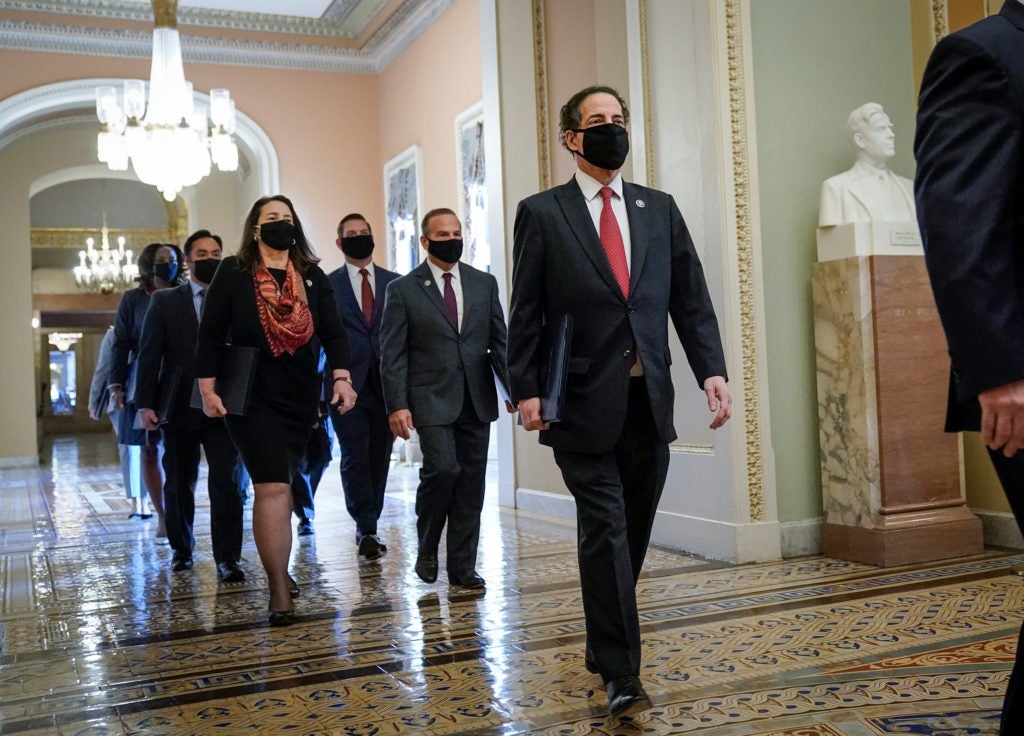
HLT: Why did you decide to enter the political world from your position in the academy?
Raskin: Politics has always run in my blood. My maternal grandfather was the first Jewish person ever elected to the Minnesota state legislature. I’ve got a bunch of politicians and union organizers on the paternal side of my family, and my father was a political philosopher. So I guess you could say it was over-determined that it would happen one day, although I do have an essentially academic temperament and disposition.
In 2006, I picked up the newspaper one day to read an article about how my state senator had introduced a bill to expand the death penalty in the state and then also had introduced a pro-Iraq War resolution. I decided right there on the spot that I wanted to run for the state senate, which is a part-time assignment in our state. I started telling people I was going to run against this 32-year incumbent, who was the president pro tem of the Maryland Senate. People said it was crazy because you can’t beat a 32-year incumbent. When I first announced, there was a pundit quoted in the newspaper who said Raskin’s chances of victory are considered impossible. And then nine months later, we got 67 percent of the vote. The Washington Post had another article quoting a pundit who said Raskin’s victory was inevitable. So we went from impossible to inevitable in nine months. I like to tell the young people, don’t be afraid because in politics, nothing’s impossible. And nothing’s inevitable. It’s only possible through the democratic arts of educating people and organizing people for change.
HLT: What do you tell young people today who might be interested in politics, but might have some concerns based on the political environment today?
“[My dad] used to say that when everything looks hopeless, you’re the hope.”
Raskin: I always quote my dad. He used to say that when everything looks hopeless, you’re the hope. And I feel that strongly with this generation. I mean, this is a magnificent generation that really has gotten beyond racism and sexism and anti-Semitism and homophobia. When all things are considered, it’s a pretty wonderful generation. And I’m totally devoted to them because of my son and my daughters too.
HLT: You also quoted your dad [Marcus Raskin, who died in 2017] during one of your speeches as House impeachment manager. It seems like he is a powerful influence on you.
Raskin: Yeah, my father was an extraordinary guy. He was a concert pianist, and then decided that he wanted to go to law school. He was studying philosophy at the same time. He went to law school to try to figure out whether there could be an international legal regime that could end war. That was really his passion. He became an adviser to President Kennedy on the National Security Council, and he founded the first progressive think tank called the Institute for Policy Studies.
He’s very similar to my son Tommy. He also lived his life with uncompromising courage. He was indicted in 1968 with Dr. Spock in a case called the Boston Five trial for conspiracy to aid and abet draft evasion. My father was indicted because he’d written a statement called “a call to resist illegitimate authority.” He was making the argument that the Vietnam War was an illegal war because it had never been declared by Congress and because it was in violation of the Geneva Convention. My father’s strategy was to try to put the war on trial. He was actually the only one of the five who was acquitted by the jury, but the other convictions were reversed on appeal. So, none of them ended up going to prison.
That case had made a real impression on me as a child. I was six years old at the time, and we were terrified that my father was going to go to prison. And they told us honestly that it was possible. That left an impression on me about the power of the state and also the importance of taking democratic government seriously. So, we miss my dad a lot. I’m not sorry that he wasn’t here to see what happened on January 6 because that would have broken his heart.
HLT: You mentioned his goal in going into law school. What was your goal in going to law school?
Raskin: My goal in going to law school was to understand as completely as possible the legal architecture of democracy, and then to make it work as much as possible for as many people as we can, as much of the time as is feasible. So, for me, democracy and the rule of law are totally intertwined, and law school was a way for me to focus my passion for democracy.
“For me, democracy and the rule of law are totally intertwined, and law school was a way for me to focus my passion for democracy.”
HLT: Did Harvard Law School help you do that?
Raskin: Yes, I love Harvard Law School. A lot of people will tell you that they loved college, but they didn’t like law school. I was kind of the reverse. I found everything I was looking for when I got to law school in an intellectual sense. And I had just remarkable professors. I had Duncan Kennedy. I had Randy Kennedy. I had Morton Horowitz. I had Dan Meltzer. I had Susan Estrich, Derrick Bell, so I got an absolutely dazzling education at Harvard Law School.
Professor [Laurence] Tribe has always been extremely important to me. And he helped me so much through the impeachment trial and immediately alighted upon all of the key pressure points of the case, which he was good enough to talk me through.
I’ve been a professor of constitutional law for three decades now. That’s been my passion ever since I took constitutional law with Professor Tribe back in January of 1986. And that’s the class where I found both my professional ambition, and I also found my wife, Sarah. She was in the class too. And I used to go in and spend the class just staring at her. I thought she was looking back at me, but it turned out she wasn’t wearing her contact lenses.
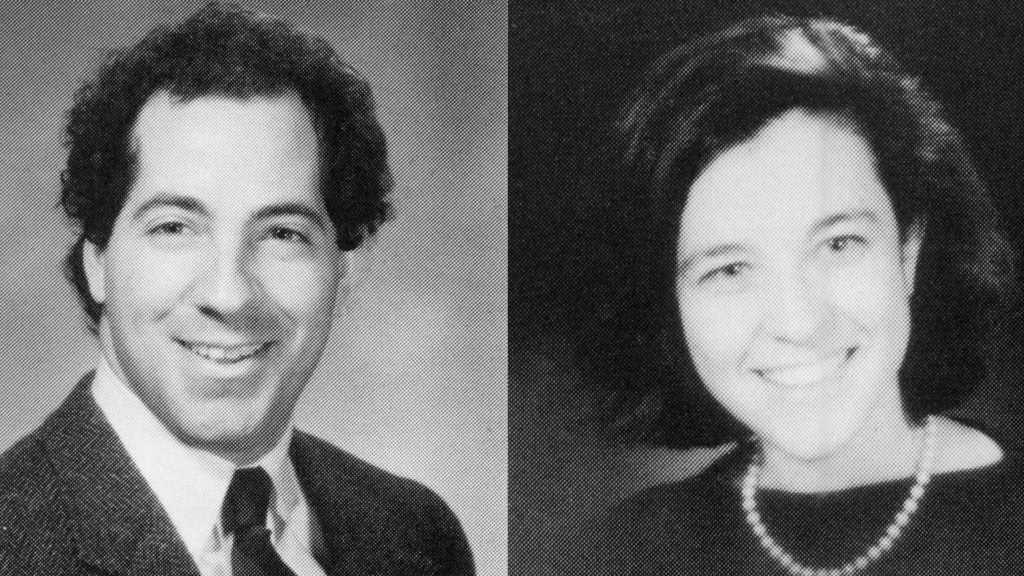
Jamie Raskin ’87 and Sarah Bloom Raskin ’86
HLT: How did you get Sarah’s attention?
Raskin: I didn’t really get to meet Sarah until the end of the semester. I was at Langdell Library, and I was coming down the stairs and she was coming up. I said, “Hello.” My heart started beating pretty fast. And she said, “Hello.” And then she said: “What’s your name?” I said Jamie, and she said, “My name is Sarah.” And she said, “I just wanted to know, because I had a dream about you last night.” At that point, I kept going back to the library for the rest of the semester, and I started bringing her flowers or ice cream, or whatever it might be.
I made very close friends at the law school. A big group of them just came down to see me. And people at the law school have really been wonderful to us through this trauma, and we’ve heard from a lot of Tommy’s classmates and friends. We’ve heard from a number of Tommy’s professors, and it’s really moved us how much the Harvard Law School community has rallied around our family and also spoken so glowingly of Tommy in what he did in his year and a half there.
This interview was condensed and edited for clarity.
